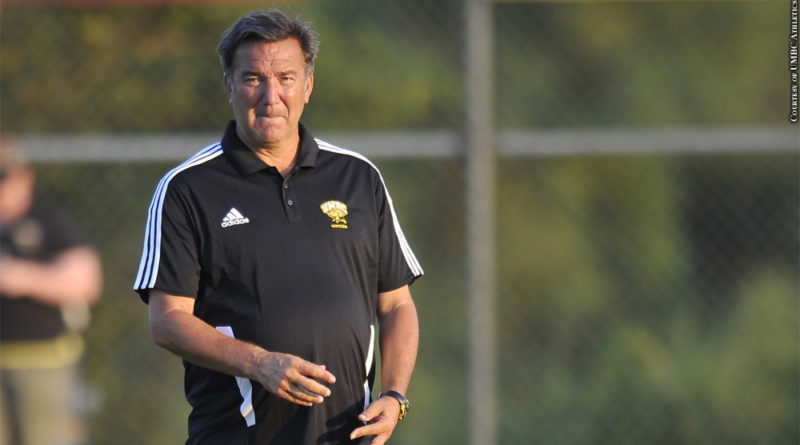As the coronavirus pandemic continues to ravage the country, the feasibility of playing college sports in the fall has come into question. Beginning with the Ivy League July 8, a number of conferences and institutions have postponed their fall seasons, while bigger leagues such as the ACC and Big Ten are still weighing their options.
The America East Conference — home to the UMBC Retrievers — falls into the former category, as the league shut down fall sports July 16. For Brian Barrio, the school’s athletic director, that was the right call.
“We looked at every possible scenario that would let us play a season and give a competitive experience to these students,” Barrio said on Glenn Clark Radio July 22. “I don’t think taking that chance [of playing in a pandemic] is consistent with the values that UMBC has as an institution.”
The decision impacts five teams: men’s and women’s soccer, men’s and women’s cross country and volleyball. For men’s soccer coach Pete Caringi, postponing the season seemed inevitable, but he was still saddened when the official announcement came down.
“I wasn’t shocked by it, and I was actually pleased that they announced it when they did because any longer and it continues to get … the players’ hopes up,” Caringi said on GCR July 20. “It’s very disappointing but understandable, that’s for sure.”
Caringi said he’s been receiving updates in weekly meetings throughout the pandemic and has been in constant communication with Barrio, his players and the conference. When the number of coronavirus cases seemed to be plateauing about six weeks ago, Caringi had more hope that a fall season would happen. But that feeling waned as case numbers began to spike in mid-June.
The veteran coach has dealt with plenty of ups-and-downs throughout his long tenure as the club’s head coach — Caringi is entering his 30th season at the helm and led the Retrievers to the College Cup in 2014 — but he has never faced a situation like this. He said he’s tried his best to keep in constant contact with his players and gently discuss the looming prospects of a canceled season with them.
“What we’ve done by communicating a lot with them is kind of softening the blow, letting them know there’s a possibility of not playing rather than the other end [of ignoring it],” Caringi said.
Barrio, meanwhile, is facing the pandemic with a different perspective. He is entering his first full year as UMBC’s athletic director after taking the position in December 2019 and has more to juggle than coronavirus-related safety concerns. Any alteration to the athletics season could bring about a significant financial hit to the university, while any outright cancellation could be devastating.
Fortunately for UMBC, there is less of a financial stake in postponing fall sports because the school does not field a football program. For schools such as Maryland, football is an athletic department’s biggest source of revenue, and many leagues that sponsor football have hesitated to release a fall plan yet because of that.
As a non-football conference, the America East does not have to worry about football-related revenue losses. Further, the conference did not rule out playing basketball — its biggest income source — on time or pushing all competitions into the spring, but Barrio said that would bring about practical concerns beyond the pandemic.
“We have limited resources, limited staff [and limited stadiums], and I think it would be very challenging logistically to pull off 15 seasons at once,” he said.
Barrio added that the conference is more optimistic than he is that sports will be played in the winter and spring, but regardless, he hopes those seasons can start on time. The league has been monitoring the return-to-play procedures of professional sports leagues such as MLB and the NWSL and is crafting a protocol based on lessons learned from those plans, Barrio said.
The conference has also been discussing a number of unconventional, outside-the-box ideas in order to ensure all teams get to safely play. For Caringi’s squad, that could mean neutral site tournaments or a shortened schedule against conference foes in the spring if it can’t play a full season. The 65-year-old said his team will treat the extended time off like they would an offseason, with routine practices and workouts.
But even if a spring season happens, postponing fall sports will have a profound impact on UMBC’s athletes. If that season does not happen, though, the lost opportunities will be devastating.
“It’s a crushing blow to these student-athletes,” Barrio said. “These are high-level athletes who’ve trained their whole lives. For most of them, this is the highest level of competition they’re ever going to face, and it’s been ripped out from them.”
For more from Barrio, listen to the full interview here:
For more from Caringi, listen to the full interview here:
Photo Credits: Courtesy of UMBC Athletics

